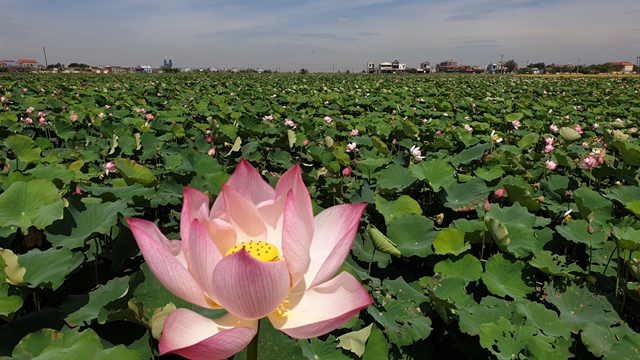 Society
Society

Farmers across Việt Nam have found lotus a profitable alternative crop for rice, especially when their land is unfertilised.

|
| A lotus pond in Xuân Vinh Commune, Xuân Trường District, Nam Định Province. Local farmers for the last few years have shifted from rice to lotus to make use of unfertilised land. — Photo danviet.vn |
NAM ĐỊNH — Farmers across Việt Nam have found lotus a profitable alternative crop for rice, especially when their land is unfertilised.
Fifty-year-old farmer Nguyễn Văn Đôn in Xuân Vinh Commune, Xuân Trường District, the northern province of Nam Định, started growing lotus three years ago on more than 2ha area of sunken land that he rented from other local farmers.
The land had not been used for years as it was unfertilised and failed to grow rice, Đôn said, adding that he rented the land and restored it for lotus cultivation.
With proper farming technique and fertilising, Đôn’s lotus plants have grown well on the land.
Đôn said his family harvested about four tonnes of lotus seeds and thousands of lotus flowers each year.
He sold each kilo of seeds for VNĐ25,000 -35,000 (US$1.07 -1.5) and each flower for VNĐ3,000.
“Compared with rice production, growing lotus is much more stable and economically profitable,” he said.
Đông calculated that he could harvest about 170kg of lotus seed per sào (1 sào equals 360 sq.m) per year, which helped him earn more than VNĐ5million ($214) while he only earned about VNĐ500,000 when growing rice.
“When growing rice, we have to buy fertiliser, pesticides and hire labourers to plant and harvest while we hardly spend any money on fertiliser or pesticide,” Đôn said, adding that he could have some extra income thanks to shrimp and fish caught from the lotus pond.
“Without fertiliser, a lotus pond is a good place for shrimp and fish to live,” he said.
The beauty of lotus flowers and their scent during summer days also attracts many visitors to Đôn’s lotus pond.
Vũ Mạnh Cầm, head of Xuân Vinh Commune Farmers’ Association, said local farmers shifted from rice to lotus three years ago and the area of lotus farms has steadily increased.
Now, more than 10ha of land is used for lotus cultivation.
“Lotus plants help many households in the commune escape poverty and generate jobs in the rural area,” Cầm said.
In Thạch Hà Town, Thạch Hà District in the central province of Hà Tĩnh, farmers also earn about VNĐ70 million ($3,000) per hectare of lotus, double the income they gained from rice.
Lê Phi Quốc of Thanh Châu Hamlet, Thạch Hà Town, said that he first brought lotus to grow on his unused land for fun as he saw lotus flowers were so beautiful.
For years, Quốc and many local farmers did not grow rice on the land after losing crops, he said, adding that they were very surprised and happy to see lotus grow well.
“We harvested lotus seeds and could sell them for quite high prices, so we started concentrating on nursing lotus plants to get seeds and flowers,” he said.
A kilo of fresh seeds can be sold at VNĐ30,000-50,000 ($1.29 -2.15) while the dried seeds are VNĐ160,000 ($7) per kilo.
Vice chairman of Thạch Hà Town People’s Committee Nguyễn Đình Đức told danviet.vn that local authorities encouraged farmers to make used of unfertilised land to grow lotus.
Meanwhile, about 100 households in Mỹ Sơn hamlet, Duy Phú Commune, Duy Xuyên District in the central province of Quảng Nam have used their unfertilised land to grow lotus.
Trần Anh Lang, a local farmer, said that lotus could generate income three times higher than rice.
With 0.5ha of lotus, his family earned more than VNĐ100 million yearly.
Local farmers also received technical assistance from the district’s Agriculture Technology Centre and last year, the province’s Farming Products Quality Control Department helped them grow lotus to meet VietGap. standards
In Duy Xuyên District, lotus is grown on about 100ha, mostly in Duy Phú and Duy Sơn communes.
The district plans to expand its lotus cultivation area and develop a value chain for lotus so growers could benefit from the province’s supporting policy which offers free seedless farming materials and find a market for products, said head of the district’s Agriculture Department Trần Huy Tường. — VNS




